Graham Reid | | 4 min read
Ernest Ranglin and Monty Alexander: Redemption Song (2004)
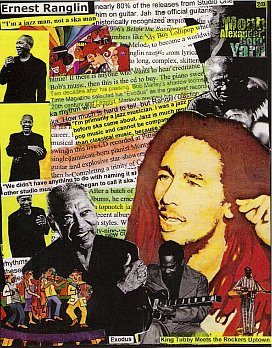
Twenty years after the death of its
high priest, reggae still informed the vocabulary of music. Reggae
had so thoroughly infiltrated pop, rock, hip hop and electronica, we
hardly noticed it any more. Still don't.
And if it isn’t in the music itself –
the bass lines, off-accent drumming, choppy guitars – then it's in
the attitude reggae producers such as Lee Perry, King Tubby, Clement Dodd and
others brought to what was possible in a studio. Yes, Bob Marley may be gone
-- and Peter and so many more -- but the musical message they brought
lives on everywhere.
Well, almost everywhere.
No one seriously expects classical
musicians to explore reggae riddum (although there’s no reason why
they shouldn’t and the Reggae Philharmonic Orchestra had a decent stab at it) and jazz was particularly tardy in tuning in.
Certainly down the years there were jazz musicians who tuned to
reggae, most notably sax player Oliver Lake who in 1978 (around the
time of Bob's Kaya) recorded the track Change One, which had an
unmistakable Caribbean influence.
Lake, who co-founded the Black Artists
Group in St Louis in 1968 after being inspired by Chicago’s AACM,
always had an interest in Caribbean music, but a trip around the
islands in '80 confirmed for him there was a rhythmic pulse worth
delving into seriously.
He formed Jump Up, a lively jazz-dance
band which took off into reggae and back-to-Africa styles. Throughout
the early and mid Eighties, Jump Up (in vibrant multi-coloured stage
outfits in the manner off the Art Ensemble of Chicago) were something
of a sensation and even now their self-titled debut and Plug It
albums are worth tracking down.
However Lake also played in the World
Saxophone Quartet and other projects which became more successful so
Jump Up withered and faded.
Bassist Jamaaladeen Tacuma also
explored reggae around the same time and UK saxophonist Courtney
Pine, who grew up on the stuff, always used it as a springboard.
There have been others too -- London’s
Jazz Jamaica was more JA-UK-MOR than jazz however – but
surprisingly few.
Most visible has always been guitarist
Ernest Ranglin, the man many say invented ska in Coxsone Dodds'
Jamaican studio in the late Fifties.
In '59 Ernest Ranglin recorded the young Bob
Marley, but his most visible ska hit was My Boy Lollipop with Millie
Small in '64.
Ranglin told me ska never had the
opportunity to be taken further because the producers wanted to keep
hits coming by not messing with the choppy, addictive formula. So he
headed to London and Ronnie Scott’s jazz club, and to this day
insists he is a jazz musician, but one with a foot in reggae. He
toured with Jimmy Cliff in the Seventies and latterly recorded
excellent reggae-conscious jazz albums: Below the Bassline from '97
featured pianist Monty Alexander and Memories of Barber Mack from the
following year had Sly Dunbar on drums.
Ranglin has the reggae spirit within
him.
And so does Alexander, whose Goin' Yard
in '01 completed a trilogy of reggae-jazz recordings which began with
Stir it Up from '99 where he played Bob songs, and Monty Meets Sly
and Robbie. Alexander incorporates nyabinghi rhythms, melodica, the
breezy JA-vibe and fat-bottom bass into his jazz-reggae and never
sounds anything less than authentic, and unique.
Should any hardcore jazz head doubt
Alexander‘s credentials, we need only note the Jamaican-born
pianist also played with Milt Jackson, Dizzy Gillespie and Sonny
Rollins.
Goin’ Yard, recorded live in
Pittsburgh, is at its best when he dug into Augustus Pablo's King
Tubby Meets the Rockers Uptown, and creates epics out Marley's Could
You Be Loved and Exodus, the latter opening with him weaving into the
melody via the famous theme to the movie of the same name.
The material not drawn from reggae but
contemporary jazz sounds the best.
Around the same time as the engrossing
Goin' Yard was a jazz tribute to Bob under the appalling title, A
Twist of Marley (a cousin to A Nod to Bob, ie. Dylan).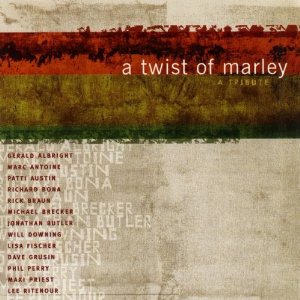
It featured guitarist Lee Ritenour,
pianist Dave Grusin, trombonist Bill Reichenbach and vocalists Maxi
Priest, Lisa Fischer, Jonathan Butler and Phil Perry among others.
As expected with a tribute, it was
patchy (if I never hear the “r'n'b version” of Get Up Stand Up
again L’ll be happy) and Ritenour always makes albums with a high
Teflon factor. (See? Nothing sticks!)
There was some good stuff – Exodus is
hard to screw up and saxophonist Michael Brecker doesn't, and
trumpeter Rick Braun plays tough but sensitive mute work on So Much
Trouble – but overall you’d probably file it in your
under-explored “tribute” pile rather than the “reggae” or
“jazz” stacks which get repeat plays.
The odd thing in this jazz-reggae
however is just how readily Marley's music can be adapted.
The strength of his melodies, and the
memorable riffs he wrote (Jamming and Could You Be Loved are
recognisable from the first bar) can be bent to other purposes.
On the Twist album there’s a South
African treatment of Redemption Song by Richard Bona complete with SA
vocal chorus which is pretty damn nice. And Will Dowling – who
turned in an excellent treatment of Coltrane’s A Love Supreme at
the start of his career in the late Eighties – finds a well of late
night sweet soul feeling at the heart of Is This Love.
Polite as he was, Bob would have
doubtless been generous about the Twist of Marley album, but – without
wishing to second guess what the dead might have said as we never
should do -- you suspect he'd have passed on most of this tribute,
but would have delighted in Dowling's Is This Love.

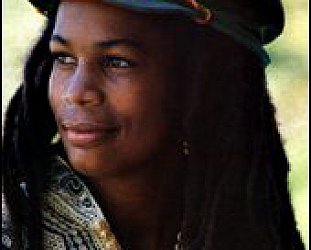
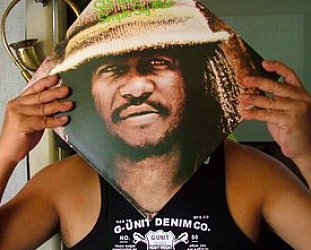
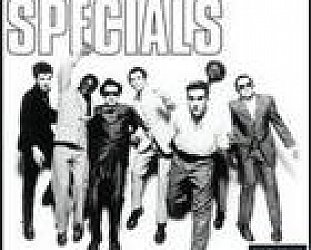
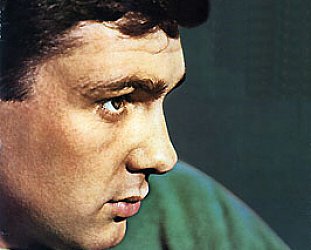
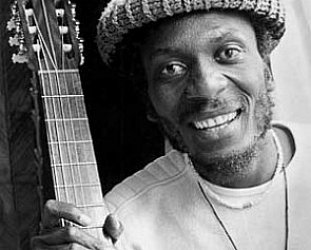
David Sampson - Sep 3, 2015
Thanks for a great article Graham. Another fine reggae-jazz CD to remember is Reggaeology (on Rogueart in 2010) by the ridiculous line-up of Hamid Drake, Napoleon Maddox, Jeff Parker, Jeff Albert, Jeb Bishop and Josh Abrams
SaveCheers
post a comment